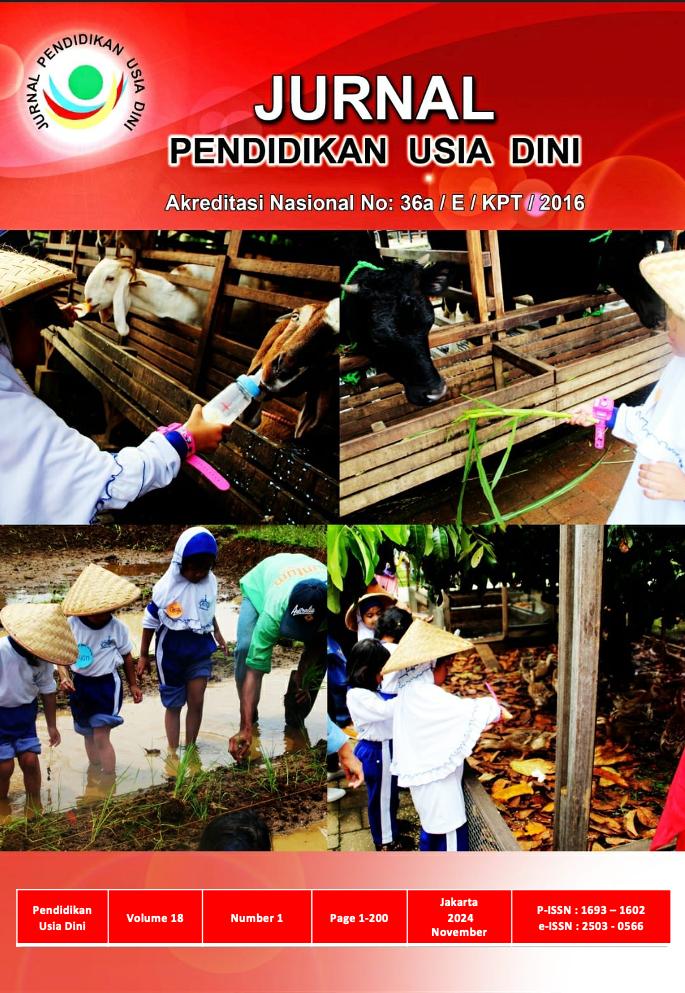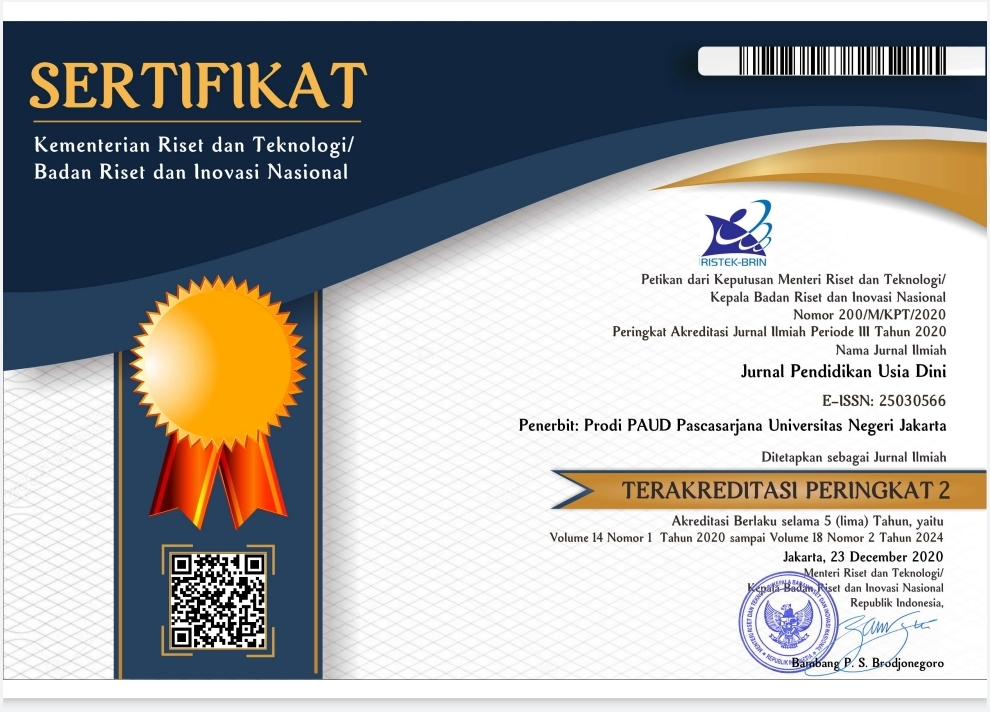The Effect of Differentiated Learning Models on the Problem-Solving Abilities of Children Aged 5-6 Years
DOI:
https://doi.org/10.21009/JPUD.181.12Abstract
It is important to develop problem-solving abilities in early childhood because in everyday life children will be faced with various problems that must be resolved. Teachers must create a conducive and more creative environment to motivate children to solve problems. This research aims to determine whether there is an influence of the differentiation learning model on the problem-solving abilities of children aged 5-6 years. The research approach used is a quantitative approach with a quasi-experimental design type of research and designing experiments that include an experimental group and a control group. Data collection techniques include tests, observation, and documentation. The data analysis technique used consisted of prerequisite tests and an Independent Sample t-test with a population of 41 children. From the results of the analysis of the Independent Sample T-test, it can be proven that the results of the research hypothesis that has been formulated are that there is a difference in the average problem-solving abilities of children aged 5-6 years because Ho is rejected and Ha is accepted, that is, there is the influence of the differentiation learning model. about the problem-solving abilities of children aged 5-6 years. Researchers propose that instructors who are interested in applying a diversified learning strategy construct a variety of activities to better assess learning and potential based on the research that has been conducted. The inclinations of every student are based on their unique abilities and interests. It is advised that future researchers wishing to perform comparable studies choose tasks that are more suited for monitoring youngsters between the ages of five and six to study their problem-solving skills.
Keywords: problem-solving ability, differentiated learning, children aged 5-6 years
References:
Amini, A., Manangsang, A., Wahyudin, A., Susanti, E., & ... (2023). Application of Differentiated Learning to Increase Active Participation of Class XI Students of SMA Negeri 1 Palembang in Civics Subjects. Innovative: Journal of Social Science Research, 3, 6136–6145. http://j-innovative.org/index.php/Innovative/article/view/1077%0Ahttps://j-innovative.org/index.php/Innovative/article/download/1077/805
Anggraini, W., Nasirun, M., & Yulidesni. (2020). Application of Problem Solving Strategies in Improving Cognitive Abilities in Group B Children. Potentia Scientific Journal, 5(1), 31–39. https://doi.org/10.33369/jip.5.1.31-39
Chen, J., Zou, Y., Sun, Y. H., & ten Cate, C. (2020). On problem solving and the evolution of cognitive abilities through mate choice: a reply to Camacho-Alpízar et al. (2020). Animal Behavior, 165, e5–e7. https://doi.org/10.1016/j.anbehav.2020.05.003
Faiz, A., Pratama, A., & Kurniawaty, I. (2022). Differentiated Learning in the Teacher Mobilization Program in Module 2.1. Basicedu Journal, 6(2), 2846–2853. https://doi.org/10.31004/basicedu.v6i2.2504
Fatmawati, & Latif, MA (2019). Implementation of the Central Learning Model in Amal Insani Yogyakarta Kindergarten. The Golden Age: The Scientific Journal of Early Childhood Development, 4(2), 25–34. https://doi.org/10.14421/jga.2019.42-03
Herman, & Rusmayadi. (2018). The Influence of the Project Method on the Cognitive Abilities of Group B2 Children at Kindergarten Aisyiyah Maccini Tengah. LEARNING: Journal of Education, Teacher Training and Learning, 2(1), 35. https://doi.org/10.26858/pembelajar.v2i1.5430
Herwina, W. (2021). Optimizing Student Learning Needs and Outcomes with Differentiated Learning. Educational Science Perspectives, 35(2), 175–182. https://doi.org/10.21009/pip.352.10
Kristen, H., Susanti, EI, Purnamasari, N., Purba, M., Saad, MY, & Anggaeni. (2021). Differentiated Learning Development Model.
Kurniasih, E., & Priyanti, N. (2023). The Effect of Differentiated Learning Approaches on Reading, Writing and Numeracy Literacy Ability. Potentia Scientific Journal, 8(2), 398–408.
Lidia, Amri, NA, & Rahmat, MY (2023). Improving Problem Solving Abilities Through Tetris Puzzles in Group B Children of Kindergarten PAUD Tunas Inti Baturappe Center, Biringbulu District, Gowa Regency. 09. https://doi.org/https://doi.org/10.36989/didaktik.v9i3.1587
Marlina, Efrina, E., & Kusumastuti, G. (2019). Differentiated Learning Model to Improve the Social Skills of Children with Special Needs in Inclusive Schools [Thesis.Padang.Special Education, Padang State University]. In the Final Report on Applied Research of Leading Universities (UNP Issues). http://repository.unp.ac.id/27935/1/2019 Final Report on the DRPM Differentiated Learning Model in Inclusive Schools-marlina.pdf
Melsianjeline. (2023). The Effect of Storytelling Method Based on Series of Pictures on the Speaking Ability of Children Aged 5-6 Years in Sumarorong Kindergarten. Thesis.Makassar.Early Childhood Education Teacher Education.Makassar State University.
Munawwirah, B., Parwoto, & Ilyas, SN (2021). The Influence of the Problem Solving Learning Model with Puzzles on Children's Cognitive Abilities. Journal of Early Childhood Education Thought and Research, 7 (April). https://doi.org/https://creativecommons.org/licenses/by-nc/4.0/
Munawwirah, B., Parwoto, & Ilyas, SN (2021). The Influence of the Problem Solving Learning Model with Puzzles on Children's Cognitive Abilities. Journal of Early Childhood Education Thought and Research, 7 (April). https://doi.org/https://creativecommons.org/licenses/by-nc/4.0/
Miller, P., Betancur, L., Coulanges, L., Kammerzel, J., Vortiba-Drzal, E., Libertus, M., & J. Bachman, H. (2016). Time Spent Playing Predicts Early Reading and Math Skills Through Associations with Self-Regulation. 1(450), 1–26. https://doi.org/https://www.sciencedirect.com/science/article/pii/S019339732200082X
Nafisa, MD, & Fitri, R. (2023). Implementation of Independent Curriculum in the Implementation of Differentiated Learning in PAUD Institutions. Journal of Teacher and Learning Studies, 6(2), 179–188. https://doi.org/10.30605/jsgp.6.2.2023.2840
Nuryadi, Astuti, TD, Utami, ES, & Budiantara, M. (2017). Basics of Research Statistics. Busy Media.
Pratiwi, AP, Kurnia, R., & Nopiana. (nd). The Influence of the Natural Materials Center Learning Model on the Science and Speaking Ability of Kindergarten Group B Children. Journal of Early Childhood Education, 1, 181–200. https://doi.org/10.21009/JPUD.
Pusari, FNU (2018). Analysis of Children's Problem Solving Cognitive Abilities in Playing with Blocks. AUDI Journal, 3(2), 70–79. https://doi.org/10.33061/ad.v3i2.2729
Rista, DP (2020). The Effect of Puzzle Games on the Problem Solving Ability of Children Aged 4-5 Years. PINE: Journal of Learning Innovation Research, 5(2), 1–10. https://doi.org/10.29407/pn.v5i2.14230
Rusmayadi, Mahnur, F., & Tamsi. (2022). Practical Guide to Project-Based Learning for Early Childhood Education (HE Rafiatul Jannah (ed.)). Erlangga.
Sakina, N. (2022). Improving Problem Solving Abilities Through Simple Experiments in Children Aged 5-6 Years at the Aisyiyah Bustanul Athfal III Paranga Kindergarten, Bajeng District, Gowa Regency [Makassar Thesis: Muhammadiyah Makassar Early Childhood Teacher Education Department]. At Digilibadmin.Unismuh.Ac.Id. https://digilibadmin.unismuh.ac.id/upload/7854-Full_Text.pdf
Sari, YR, Jaya, MTB., & Anggraini, GF (2018). Using Puzzle Media to Improve Problem Solving Abilities in Children Aged 5-6 Years. Childhood Education, 15(1), 165–175. https://core.ac.uk/download/pdf/196255896.pdf
Surya, Bachtiar, ME, Herlina, & Syamsuardi. (2021). The Effect of Using Recycled Puzzle Educational Props on Children's Cognitive Development in Kindergarten. Journal of Childhood Education, 7(2), 43–53. https://doi.org/10.23960/jpa.v7n2.22750
Syamsuardi, & Hajerah. (2018). Use of Learning Models in Makassar City Kindergarten. Nursing Journal, 5(2). https://doi.org/http://e-journal.unipma.ac.id/index.php/JPAUD Usage
Syaodih, E., Setiasih, O., Romadona, NURF, & Handayani, H. (2018). Developing Early Childhood Problem Solving Abilities in Project Learning in Kindergarten. Journal of Early Childhood Education, 12, 29–36. https://doi.org/https://doi.org/10.21009/JPUD.121
Wahyuti, E., Purwadi, & Kusumaningtyas, N. (2023). Analysis of Problem Solving Abilities through Learning Literacy, Reading, Writing and Counting in Early Childhood. Hornbill: Journal of Education, Language, Literature, Arts and Culture, 3(2). https://doi.org/https://e-journal.upr.ac.id/index.php/enggang/article/download/8730/4535
Wulansari, AD (2016). Application of Parametric Statistics (R. Widyaningrum (ed.)). Felicha Library
Downloads
Published
How to Cite
Issue
Section
License
JURNAL PENDIDIKAN USIA DINI work is licensed under a Creative Commons Attribution 4.0 International License. (http://creativecommons.org/licenses/by/4.0/)





